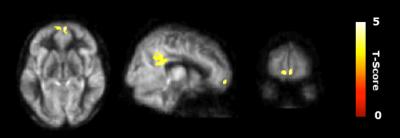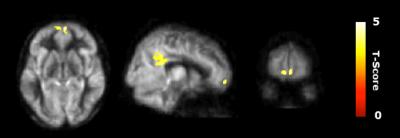
Credit: Frontiers in Aging Neuroscience
Researchers at the Center for BrainHealth at UT Dallas have demonstrated in a pilot study that cognitive training improves innovative thinking, along with corresponding positive brain changes, in healthy adults over the age of 55.
The study, published recently in Frontiers in Aging Neuroscience, reveals that a specific strategic cognitive training program enhanced innovation in healthy adults. Performance was measured by an individual's ability to synthesize complex information and generate a multitude of high-level interpretations.
"Middle-age to older adults should feel empowered that, in many circumstances, they can reverse decline and improve innovative thinking," said Dr. Sandra Bond Chapman, Center for BrainHealth founder and chief director and lead author of the study. "Innovative cognition – the kind of thinking that reinforces and preserves complex decision-making, intellect and psychological well-being – does not need to decline with age. This study reveals that cognitive training may help enhance cognitive capacities and build resilience against decline in healthy older adults."
The SMART program – Strategic Memory Advanced Reasoning Training – was developed at the Center for BrainHealth. It focuses on learning strategies that foster attention, reasoning and broad-based perspective-taking.
Center for BrainHealth researchers conducted a randomized pilot trial and compared the effect of SMART to aerobic exercise training (known to be good for brain health) and control subjects on innovative cognition. The SMART program was conducted one hour per week for 12 weeks with 2 hours of homework each week. The 58 participants were assessed at baseline-, mid- and post-training using innovative cognition measures and functional MRI, a brain scanning technology that reveals brain activity.
"In addition to evaluating the effects of the cognitive training, this study also provided an opportunity to test a reliable assessment tool to measure innovative cognition, which has been relatively neglected due to the complexity of quantifying innovative thinking," Chapman said.
The 19 participants in the cognitive reasoning training group (SMART) showed significant gains pre- to post-training in high-quality innovation performance, improving their performance by an average of 27 percent from baseline to mid- and post-training periods on innovative cognition measures. The physical exercise and control groups did not show improvement. These positive gains in the reasoning training group corresponded to increased connectivity among brain cells in the central executive network of the brain, an area responsible for innovative thinking.
"Advances in the field of MRI are allowing us to measure different aspects of brain function," said Dr. Sina Aslan, an imaging specialist at the Center for BrainHealth. "Through this research, we are able to see that higher activity in the central executive network corresponded to improved innovation. These findings suggest that staying mentally active not only mitigates cognitive decline, but also has the potential to restore creative thinking, which is typically lost with aging."
While further research is needed to establish how to ensure the benefit persists, Chapman is encouraged by the results.
"Reasoning training offers a promising cost-effective intervention to enhance innovative cognition – one of the most valued capacities and fruitful outputs of the human mind at any age."
###
The work was supported by a grant from the National Institute of Health and by grants from the T. Boone Pickens Foundation, the Lyda Hill Foundation and Dee Wyly Distinguished University Endowment.
ABOUT THE CENTER FOR BRAINHEALTH®
The Center for BrainHealth®, part of The University of Texas at Dallas, is a research institute committed to enhancing, protecting and restoring brain health across the lifespan. Scientific exploration at the Center for BrainHealth is leading edge, improving lives today and translating groundbreaking discoveries into practical clinical application. By delivering science-based innovations that enhance how people think, work, and live, the Center and its Brain Performance Institute™ are empowering people of all ages to unlock their brain potential. Major research areas include the use of functional and structural neuroimaging techniques to better understand the neurobiology supporting cognition and emotion in health and disease.
Media Contact
Emily Bywaters
[email protected]
972-883-3322
@BrainHealth
http://www.brainhealth.utdallas.edu/
Original Source
https://brainhealth.utdallas.edu/cognitive-training-enhanced-innovative-thinking-brain-networks-older-adults/ http://dx.doi.org/10.3389/fnagi.2017.00314





